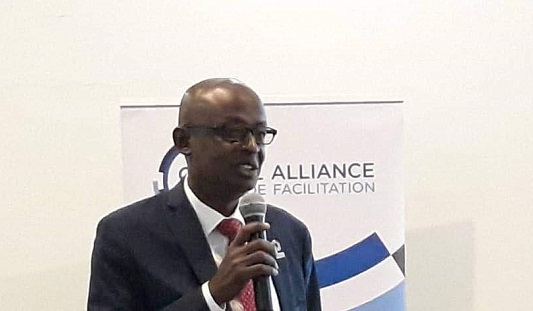The International Chamber of Commerce (ICC), Ghana – with support from the Global Alliance for Trade Facilitation and BUSAC Fund – has held a stakeholders’ forum on implementing the World Trade Organisation’s Trade Facilitation Agreement.
The forum was aimed at calling on government to commit fully to implementing some sections of the WTO agreement that will create a level playing field for various actors in the area of international trade.
Secretary General of the International Chamber of Commerce, Ghana – the lead advocating agency for implementation of the WTO trade agreement – Mr. Emmanuel Doni-Kwame, is optimistic that government will engage the various stakeholders in addressing challenges associated with implementing WTO agreements.
Mr. Doni-Kwame said some successes have been chalked up in their quest to see government commit itself in ensuring the Trade Facilitation Agreement is implemented.
“So far, a lot has been done; we as the private sector would like to focus on some key articles we know can be done immediately, and this has to do with access to information. Yes, we have gone paperless so you are able to clear your goods quickly; but you end up paying more, because some information is still not easily accessible.”
Mr. Doni-Kwame is of the view that port charges can be reviewed downward. “We have done some research and realised that some of the fees can be worked on.
“The agreement’s drafters acknowledged that less-developed countries will charge more on goods because they may not have the necessary infrastructure and need the money to develop. But with time, the fees are supposed to come down,” he added.
With the majority of Ghana’s trading being channeled through the ports and transit corridors, stakeholders and resource persons emphasised the need for government to take a critical stand in the implementation of article 1,3,6,7 provisions of the WTO Trade Facilitation Agreement.
The provisions seek to outline a blue-print on how government can minimise losses and improve upon its revenue, whereas both private sector and industry players will also have some leverage in the cost of doing business.
Ghana has completed its designation of measures in the WTO Trade Facilitation Agreement into categories A, B and C as part of what it has to do to fulfil requirements of the agreement, and established a Technical Committee on Trade Facilitation in 2013.
Ghana has received several supports, including the most recent – the Global Alliance for Trade Facilitation project on Pre-Arrival Processing.
He said not only is it important to comply with the WTO TFA, but the considerable effect it will have on foreign direct investments cannot be overestimated.
Fast-tracking production is what international markets require for the global value chain, hence members of the Technical Working Group should work assiduously to achieve the project’s objectives.
A Chief Revenue Officer at the Ghana Customs Service, Fechin Akoto, said that passage of the trade agreement will rather boost trade and not compromise it as being feared by many; adding that the Customs Division of the GRA has developed various modalities that are aimed at tackling challenges affecting revenue mobilisation, especially regarding diversion of goods.
